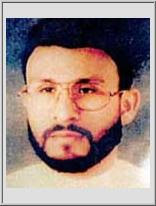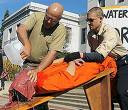
Jay E. Caldwell
19 April 2009 (Sunday)
Joseph Roach's remarkable essay, "Slave Spectacles and Tragic Octoroons," got me thinking about other sorts of "performances" and spectacles not necessarily designed to be that, and certainly more private. Mark Danner's recent piece in the New York Review of Books (LVI.6 [9 April 2009]: 69-77): "U.S. Torture: Voices from the Black Sites" is a sort of theater review. It is actually an enhanced review of the ICRC [Red Cross] Report on the Treatment of Fourteen "High Value Detainees" in CIA Custody, released in February, 2009. Danner, Professor of Journalism at UC Berkeley, is an expert in this rather murky and unpleasant subject. In 2004 he authored Torture and Truth: America, Abu Ghraib, and the War on Terror. Much of the ICRC material on which Danner bases his essay comes from a single suspected al-Qaeda chief (or at least warrior), Abu Zubaydah, who had been wounded, then captured, in a firefight in Pakistan, then nursed back to health in U.S. military hospitals before he was transferred to Guantanamo.

The Guantanamo sessions were a remarkable series of linked performances that led to other performances elsewhere. Zubaydah and his thirteen fellow "comrades" were expected to perform for a changing variety of U.S. officials: to talk, to reveal, to confess, to name names, to rat-out, to squeal. As payment for these performances they would no longer be subjected to whatever methods the U.S. military, FBI, and CIA interrogators came up with to elicit these testimonies. But the irony in all this was that the interrogators were as much performers as were the "high value detainees." Each day they'd have to come up with a new act to perform in order to tighten the screws on the prisoners, for after a while their audience would adapt and would no longer respond with the kind of applause being sought. What the prisoners probably didn't know was that their interrogators had to audition all new acts with higher-ups, maybe even as high up as Washington, D.C., before they could be included in the show's repertoire. Now the irony of all this was that while the prison guards were feigning intending to kill the prisoners, the prisoners were feigning providing valid information rather than just the shit they'd say because they figured that's what the guards wanted to hear. This must have been quite a circus with a non-stop merry-go-round of dramatic performances and an ever-changing cast. You can catch a re-enactment (by Amnesty International) of one of the scenes at http://www.guardian.co.uk/media/2008/apr/22/advertising.humanrights.

And then the Red Cross arrived. Now the prisoners had a new audience. They were also treated to a whole new show themselves. Presumably the ICRC actors, caring, humane, and officially neutral, didn't care what the detainees knew. Their agenda was to care about how the prior (and ongoing) show was carried out. The agenda of the prisoners changed, too. After all, if self-interest lies at the heart of each man's soul, then his role might change as the scenery and costumes changed. The detainees must have soon learned that the Red Cross people were going to demonstrate no malicious behavior, but whether that would translate into honesty on the part of the detainees wasn't clear. Their agenda of feigning truth out of self-preservation might continue. Danner weighs in on this by noting that what Zabaydah and his compatriots claimed to have experienced at Guantanamo was quite similar to what others in their same metaphorical boat experienced elsewhere at the hands of their U.S. captors.
And about this time a new show opened in Washington, D.C., with an all new cast, but based on the same script. The headliner of the cast was our President, George W. Bush. His agenda was to reassure his audience (us), that all was right and decent in his administration and that anything you'd heard to the contrary just wasn't true. At the White House premier in September, 2006, he admitted that while some suspected terrorists had to be secluded in "an environment where they can be held secretly [and] questioned by experts, he insisted that "The United States does not torture. It's against our laws, and it's against our values. I have not authorized it--and I will not authorize it." He added that occasionally, but in some extreme and special cases "an alternative set of procedures" had to be employed, but "These procedures were designed to be safe, and to comply with our laws, our Constitution, and our treaty obligations." Not realizing that the Red Cross would soon blow his cover he assured us that "I cannot describe the specific methods used--I think you understand why" (all 70).
And now we come to the last (or at least the most recent) series of performances. Someone leaked the Red Cross report (a brief 43-page pamphlet). You can read it at http://www.nybooks.com/icrc-report.pdf. Danner wrote his damning review (not of the ICRC but of the CIA). Unimpeachable sources were coming forward (Mr. Bush was never included in this elite group). The result was that an ACLU lawsuit that had been simmering off-Broadway for several years finally got prime-time exposure. As a response the Obama administration released 120-140 pages of minimally redacted (black felt-tip marker edits) CIA documents; these,too, can be read at aclu.org. So now the show is no longer a secret, by-invitation-only affair. The audience is now all of us and the response, after a national outbreak of hand-wringing, has been an appropriate blend of outrage, embarrassment, and anger. The result is that the long-running Guantanamo play has closed and perhaps the theater may soon be razed.
So many performances, so many actors, so many agendae, an ever-changing script. And we are all now a part of that drama.
All the world's a stage,
And all the men and women merely players;
They have their exits and their entrances,
And one man in his time plays many parts,
His acts being seven ages.
(As You Like It, II.7.139-143)
And all the men and women merely players;
They have their exits and their entrances,
And one man in his time plays many parts,
His acts being seven ages.
(As You Like It, II.7.139-143)




No comments:
Post a Comment